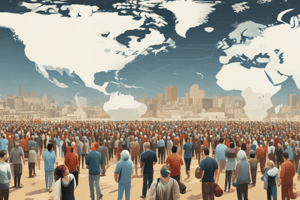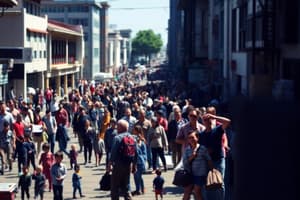Podcast
Questions and Answers
শহুরে করণ প্রক্রিয়ায় কোনটি একটি কারণ?
শহুরে করণ প্রক্রিয়ায় কোনটি একটি কারণ?
- শিক্ষার অভাব
- জনসংখ্যা হ্রাস
- সরকারি নীতি (correct)
- কৃষি বিপ্লব
শহুরে করণ প্রক্রিয়ায় কোনটি একটি পরিণতি?
শহুরে করণ প্রক্রিয়ায় কোনটি একটি পরিণতি?
- সামাজিক সমতা
- জনসংখ্যা হ্রাস
- পরিবেশ সংরক্ষণ
- অর্থনৈতিক বৃদ্ধি (correct)
জনসংখ্যা বৃদ্ধির কোনটি একটি ফলাফল?
জনসংখ্যা বৃদ্ধির কোনটি একটি ফলাফল?
- রাজনৈতিক অস্থিরতা
- অর্থনৈতিক পতন
- সামাজিক সমতা
- পরিবেশ দূষণ (correct)
জনসংখ্যা বৃদ্ধির কোনটি একটি কারণ?
জনসংখ্যা বৃদ্ধির কোনটি একটি কারণ?
শহুরে করণ প্রক্রিয়ায় কোনটি একটি ফলাফল?
শহুরে করণ প্রক্রিয়ায় কোনটি একটি ফলাফল?
জনসংখ্যার বৃদ্ধির সঙ্গে সম্পর্কিত একটি গুরুত্বপূর্ণ চরিত্র কী?
জনসংখ্যার বৃদ্ধির সঙ্গে সম্পর্কিত একটি গুরুত্বপূর্ণ চরিত্র কী?
আন্তর্জাতিক অভিবাসনের একটি প্রধান কারণ কী?
আন্তর্জাতিক অভিবাসনের একটি প্রধান কারণ কী?
জনসংখ্যার বিতরণের উপর কোনটি প্রভাব ফেলে?
জনসংখ্যার বিতরণের উপর কোনটি প্রভাব ফেলে?
শহরায়নের ফলে কী হয়?
শহরায়নের ফলে কী হয়?
জনসংখ্যার বৃদ্ধির একটি প্রধান ফলাফল কী?
জনসংখ্যার বৃদ্ধির একটি প্রধান ফলাফল কী?
Flashcards are hidden until you start studying
Study Notes
Demographics
- Study of the characteristics of human populations, including:
- Age structure: proportion of population in different age groups
- Sex ratio: number of males per 100 females
- Marital status: proportion of population married, single, divorced, etc.
- Ethnicity: racial and ethnic composition of the population
- Education: level of education attained by the population
- Occupation: types of jobs and industries represented in the population
- Income: distribution of income among the population
Migration Patterns
- Types of migration:
- Internal migration: movement within a country
- International migration: movement between countries
- Reasons for migration:
- Push factors: conditions that encourage people to leave their home country (e.g. poverty, conflict)
- Pull factors: attractions that draw people to a new country (e.g. better job opportunities, education)
- Consequences of migration:
- Brain drain: loss of skilled workers from the home country
- Cultural diversity: increased diversity in the host country
Population Distribution
- Factors influencing population distribution:
- Climate: people tend to settle in areas with favorable climate
- Topography: people tend to settle in areas with accessible terrain
- Economic opportunities: people tend to settle in areas with good job prospects
- Government policies: policies that encourage or discourage settlement in certain areas
- Types of population distribution:
- Urban: concentrated population in cities and towns
- Rural: dispersed population in countryside
- Linear: population concentrated along transportation routes (e.g. roads, rivers)
Urbanization
- Definition: process of increased population concentration in urban areas
- Causes of urbanization:
- Industrialization: growth of industry and job opportunities in cities
- Improved transportation: easier access to cities and services
- Government policies: policies that encourage urban development
- Consequences of urbanization:
- Increased economic growth: cities become hubs for economic activity
- Environmental degradation: increased pollution and strain on resources
- Social issues: increased crime, poverty, and social inequality
Population Growth
- Factors influencing population growth:
- Birth rate: number of births per 1,000 people
- Death rate: number of deaths per 1,000 people
- Migration: movement of people into or out of a population
- Types of population growth:
- Natural increase: growth due to excess of births over deaths
- Net migration: growth due to migration into the population
- Consequences of population growth:
- Increased demand for resources: strain on food, water, and housing
- Environmental degradation: increased pollution and habitat destruction
- Social issues: increased competition for jobs and services
জনসংখ্যা বৈশিষ্ট্য
- জনসংখ্যার বৈশিষ্ট্যগুলির মধ্যে রয়েছে:
- বয়স কাঠামো: বিভিন্ন বয়স গ্রুপে জনসংখ্যার অনুপাত
- লিঙ্গ অনুপাত: ১০০ নারীর বিপরীতে পুরুষের সংখ্যা
- বৈবাহিক অবস্থা: জনসংখ্যার বিবাহিত, অবিবাহিত, ডিভোর্সি ইত্যাদি
- জাতিগত পরিচয়: জনসংখ্যার বর্ণ এবং জাতিগত সংমিশ্রণ
- শিক্ষা: জনসংখ্যার শিক্ষাগত স্তর
- পেশা: জনসংখ্যার কর্মক্ষেত্র এবং শিল্প
অভিবাসন পদ্ধতি
- অভিবাসন পদ্ধতির প্রকারভেদ:
- অভ্যন্তরীণ অভিবাসন: একই দেশের মধ্যে স্থানান্তর
- আন্তর্জাতিক অভিবাসন: এক দেশ থেকে আরেক দেশে স্থানান্তর
- অভিবাসনের কারণগুলি:
- ঠেলে দেওয়ার কারণ: কোন দেশ ত্যাগ করার কারণ (উদাহরণ: দারিদ্র, সংঘাত)
- আকর্ষণ কারণ: নতুন দেশে প্রলোভন (উদাহরণ: ভাল চাকরি, শিক্ষা)
- অভিবাসনের ফলাফল:
- মেধাবী কর্মী হ্রাস: আবাসকেন্দ্র দেশ থেকে তালেন্ত কর্মী হ্রাস
- সাংস্কৃতিক বৈচিত্র্য: আশ্রয় দেশে বৈচিত্র্য বৃদ্ধি
জনসংখ্যা বিতরণ
- জনসংখ্যা বিতরণ প্রভাবিত করে:
- জলবায়ু: মানুষ উষ্ণ জলবায়ুর দেশে বসবাস করে
- ভূগোল: মানুষ সুবিধাজনক ভূগোল অঞ্চলে বসবাস করে
- আর্থিক সুযোগ: মানুষ ভাল চাকরি ও আর্থিক সুযোগ সমৃদ্ধ অঞ্চলে বসবাস করে
- সরকারি নীতি: সরকারি নীতি যা বসবাসকে উত্সাহ দেয়
- জনসংখ্যা বিতরণের প্রকারভেদ:
- নগরী: শহর ও নগরীর ঘনবসতি
- গ্রামীন: গ্রামীন এলাকায় ছিটমিহস বসতি
- রেখাবদ্ধ: পরিবহন পথের ধারে জনসংখ্যা বিতরণ
শহরায়ণ
- সংজ্ঞা: শহরের জনসংখ্যা বৃদ্ধির প্রক্রিয়া
- শহরায়ণের কারণগুলি:
- শিল্পায়ন: শিল্প ও চাকরির সুযোগ সৃষ্টি
- পরিবহন উন্নতি: শহরে যাতায়াত ও সুবিধা বৃদ্ধি
- সরকারি নীতি: সরকারি নীতি যা শহরায়ণকে উত্সাহ দেয়
- শহরায়ণের ফলাফল:
- অর্থনৈতিক বৃদ্ধি: শহরগুলি অর্থনৈতিক কর্মকাণ্ডের কেন্দ্রে পরিণত হয়
- পরিবেশ ক্ষতি: পরিবেশ দূষণ ও সম্পদ ব্যবহার বৃদ্ধি
- সামাজিক সমস্যা: অপরাধ, দারিদ্র ও সামাজিক অসমতা বৃদ্ধি
জনসংখ্যা বৃদ্ধি
- জনসংখ্যা
Studying That Suits You
Use AI to generate personalized quizzes and flashcards to suit your learning preferences.




